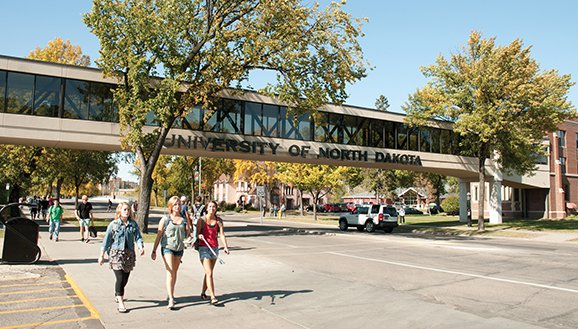One In Three Male College Students Would Rape A Woman?

UPDATE: The ThinkProgress story erred in stating that the study was of UND students. It was not. No UND students took part per UND spokesman Peter Johnson. The original ThinkProgress story linked above had this headline: “1 In 3 University Of North Dakota Men Surveyed Would Rape A Woman If They Could Get Away With It.” That has now been changed with no posted correction from the story’s author Tara Culp-Ressler. I have edited this post to reflect the correction, however, including the updated ThinkProgress headline.
Here’s a shocking headline: 1 In 3 College Men In Survey Say They Would Rape A Woman If They Could Get Away With It
It’s based on a study conducted by UND researchers which you can read here.
Researchers questioned 86 male college students – most juniors, most caucasian – of which 73 sets of responses were used in the study’s conclusions. The shock headline was based on the responses of 26 men (just over 31 percent of the sample) who said they would “force a woman to sexual intercourse” if they could be sure they’d never get caught.
[mks_pullquote align=”right” width=”300″ size=”24″ bg_color=”#000000″ txt_color=”#ffffff”]”I suspect that if researchers asked these students about other crimes they might be willing to commit if they were guaranteed to get away with it – theft, perhaps, or murder – that a disturbing number would have said “yes” there too.”[/mks_pullquote]
Researchers also highlight that when the question is worded different – specifically, if they use the word “rape” instead of “force” – just 11 of the respondents said they’d do it.
Either way, it’s troubling that so many of the respondents would answer either question about forced sexual activity in the affirmative. But how much can we trust these results?
Obviously they feed the “campus rape” narrative many activists espouse, but I have two problems with the research:
- How can you draw meaningful conclusions the responses of just 73 college students at one institution?
One of the major problems with another hair-raising statistic often touted by the campus activists – that 1 in 5 women are sexually assaulted on American college campuses – is that the number was drawn from a similarly small study with some major weaknesses. “The estimated 19% sexual assault rate among college women is based on a survey at two large four-year universities, which might not accurately reflect our nation’s colleges overall,” wrote Northeastern University’s James Alan Fox and Mount Holyoke College’s Richard Moran of the statistic. “In addition, the survey had a large non-response rate, with the clear possibility that those who had been victimized were more apt to have completed the questionnaire, resulting in an inflated prevalence figure.”
In October the Department of Justice released actual figures for campus sexual assaults and found a much smaller number, about 6.1 assaults per 1,000 students. Not only is that a rate that’s actually lower than sexual assaults for the overall female population (the rate is 7.1 per 1,000 among non-students), but it has declined by about 60 percent (Bureau of Justice Statistics report here).
- How can you draw meaningful conclusions from a fantasy scenario?
It may send a chill down our spines that any male would say that he would rape a woman, or force sex upon a woman, but what real-world conclusions can we draw from responses to a fantasy scenario?
Because that’s what this is.
Researchers asked male students if they would commit a crime if they were guaranteed to get away with it, but the real world has no such guarantees. In fact, the public spends a great deal of money on facilitating the investigation and prosecution of such crimes.
I suspect that if researchers asked these students about other crimes they might be willing to commit if they were guaranteed to get away with it – theft, perhaps, or murder – that a disturbing number would have said “yes” there too. I also suspect that the affirmative responses would be echoed in additional surveys of the broader public, both male and female. Perhaps it is a dark commentary on human nature, but I’m pretty sure a lot of people would do ugly things if they were immune to consequences.
This explains the necessity of law and order.
“If men were angels, no government would be necessary,” wrote James Madison in Federalist #51. Humanity, isolated from consequences for their actions, turns to depravity. This isn’t some new revelation. William Golding covered this territory in Lord of the Flies back in 1959. Rod Serling explored it in the classic Twilight Zone episode, “The Monsters are Due on Maple Street
” which aired in 1960.
They were hardly the first.
Are these responses disturbing? Yes. Do they represent a new revelation? Or something unique to the issue of sexual assault on campus? No.
The UND researchers should have put these responses in context. Did the respondents only feel this way about sexual crimes, or crime in general? How about other demographics, such as females? Did they express a willingness to commit crimes absent consequences?
I would be interested in knowing how many female students might say they would make a false rape accusation to get someone else in trouble if they could get away with it.
We might find the answer to be similarly disturbing.
Instead of focusing on fantasy scenarios, we ought to be focusing on the facts. How many sexual assaults actually occur on campus? The best numbers available to us suggest they happen with a lower frequency than they do in the overall public.
Of course, that sort of hard data isn’t convenient for certain narratives.




